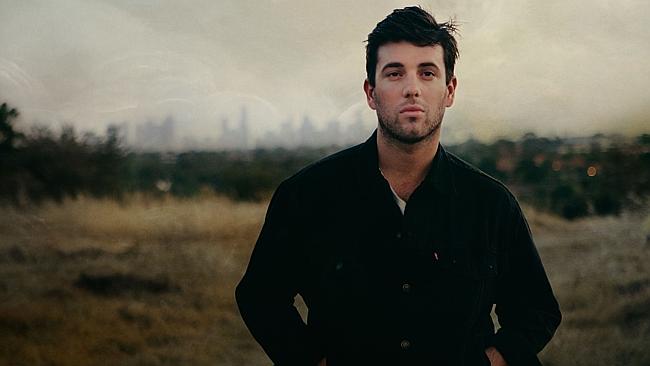Sex please, we have no mercy

Alexander Gow is Oh Mercy.
Source: Supplied
THIS week’s album reviews from The Courier-Mail (ratings out of five stars):
POP
Oh Mercy, When We Talk About Love
(EMI) ****
Emotional honesty and a poetic sensibility are at the heart of the singer-songwriter craft, and four albums into his career Alexander Gow, aka Oh Mercy, knows that well.
Just don’t mistake the lyrics he is delivering here as merely lines.
When We Talk About Love is an album of soul-baring, unflinching honesty, without recourse to metaphors or layers.
Gow lays it out in plain view on the opening track, Without You, a bright, breezy pop-rock tune with a gorgeous swell of strings where he declares “Things have changed since you’ve been gone/The sun don’t seem so bright’’. The colours of the music are often vibrant but this is a man who feels hollow inside, lacerating himself about the collapse of a relationship: “I used to feel proud and true/But now I just feel ashamed.’’
So right now you are saying, just one more apparently successful guy moaning about how he messed up his life, right? It’s hardly new territory. The lingering damage of failed relationships has been fuelling albums ever since Frank Sinatra’s In the Wee Small Hours of the Morning, and that was released in 1955.
Most people reading this will have a shelf-full of them, from Bob Dylan’s Blood on the Tracks to Marvin Gaye’s Here My Dear, Beck’s Sea Change and The Triffids’ Calenture.
But something about Gow’s brutal clarity, combined with sweet melody and sensitive arrangements, makes this all feel fresh. He knows not to cloak these dark mea culpas in maudlin tunes, and a song like Let Me Be Him — and you know what that’s about — pulses along with chiming guitars and pianos. Musically, it’s sunny, even as Gow delivers lines like “Does he move in that way? The way I never dared?’’
Most songwriters leave out the sex from albums like these, but not Gow, who returns to those memories several times.
His clarity about the events which led him here were magnified by the dislocation of a year in exile in the US. No repenting at leisure for Gow: these songs started to flow as the distance from his home country grew.
Songs like Sandy, If You Come Around Tonight and All Roads Lead to You are offered up in the same breezy style, sounding for all the world like a band is trying to inject optimism and light into songs their leader has summoned up from a dark place. Except it’s not a band. The album was recorded quickly and without fuss in Australia and Gow plays all the instruments except for the string quartet.
He efficiently works through the broken-hearted lover’s checklist: jealousy, rage, despair, confession, not to mention murderous thoughts.
And, on the album’s best song, Lady Eucalyptus, something approaching acceptance, concluding: “So alone I dine at love’s great feast/I suck the flesh within/But I burnt my mouth yet again/I still can’t taste a thing.’’ If I can quote another dislocated alien, E.T.: “Ouch’’
For those in a similar state, possibly too raw for immediate consumption. For the rest, it’s his best album.
Noel Mengel
POP
James Taylor, Before This World
(Universal) ***1/2
Not everything in this world has to be new, hi-tech or a clickbait rant. Indeed, most of us need a place to escape all that, and that’s a role Taylor has been fulfilling since his 1968 debut. In his early work he covered deep emotional territory but there is something about that soothing voice and easy melodic grace that lifts the spirits. Also, his fans still buy records, giving him a US No. 1 with this album, a feat not even matched by 1970 classic Sweet Baby James. This first album of original material since 2002 does exactly what you expect a Taylor record to do. Tracks like Today Today Today, with its acoustic guitar, fiddle and harmonica, sound like they were recorded circa 1970. Montana is another of his pretty oh-to-be-somewhere-else ballads, while the soul flavours he has often infused in his work comes through on Stretch of the Highway and Watchin’ Over Me. Taylor can find a song in something as simple as Canadian winter (Snowtime), or as traumatic as the conflicted emotions of a soldier (Far Afghanistan).
Noel Mengel
POP
Barenaked Ladies, Silverball
(Vanguard/Caroline) ****
Twenty-seven years on, Barenaked Ladies are here to tell you it’s not whether you win or lose, it’s that you’re still in the game. “I know you can’t win them all, but I’m swinging like Pitt getting hits in Moneyball,” frontman Ed Robertson declares on bouncy motivational opener Get Back, which will have you shadow-boxing on the spot. The album is chock full of such fun, upbeat pop-rockers, but it’s a pair of sublime ballads that comprise the knockout one-two punch, and portray two different struggles: Toe to Toe is about weathering the battles of a long-term relationship, while Tired of Fighting With You is secondary singer Kevin Hearn’s take on his second battle with cancer: “I think of my little girl/Biggest love in the world/I know I’ll fight some more/I know what I’m fighting for.” Hearn sounds like Tim Finn, and the parallels don’t end there: The dark, swirling keyboards of Narrow Streets are straight out of Split Enz in their prime. Silverball reveals itself slower than predecessor Grinning Streak, but has more staying power.
John O’Brien
POP
Ben Lee, Love is the New Rebellion
(Warner) ****
It’s easy not to like Ben Lee, whether you agreed with Bernard Fanning’s famous description or simply can’t fathom how he snagged Claire Danes (albeit temporarily). But one must grudgingly acknowledge his pop sensibility, which seems to be getting sharper with age. Here he returns to the hippy shake of the grammatically questionable Awake is the New Sleep with more musings on life, love, loss and letting go. Lee’s lyrical mantras are backed by his trademark catchy pop hooks, and if you found Catch My Disease infectious, expect to get that fever again. “You’re not gonna find me crying over yesterdays,” he sings on Changing My Mind. Yes, he’s a man at peace with the fleetingness of life (Goodbye to Yesterdays), the futility of bitterness (Forgiveness), the power of optimism (Happiness) and the inevitability of mortality (Everybody Dies). Most solemn are the acoustic numbers The Body of Love, about rejoining the universal oneness, and Everything is OK, “even when it’s not”.
John O’Brien
ROCK
Desaparecidos, Payola
(Epitaph) ****
It’s been more than 13 years since Desaparecidos’ last (and first) full-length Read Music/Speak Spanish, and clearly singer-songwriter Conor Oberst — better known for the folk-pop of bands such as Bright Eyes — has a fresh fire in his belly. The album opens with the none-too-subtle The Left is Right (“If one must die to save the 99/Maybe it’s justified/The left is right’’), which gives a fair indication as to where the album is headed thematically, with issues such as the failures of democracy (lead single City on the Hill), radicalisation (Radicalized), and armchair activism (Slacktivist). Musically, the band have taken a lot of their cues from ‘90s emo and pop-punk, and although some lyrics are a little on the rudimentary side — expect broad brushstrokes rather than forensic minutiae — Oberst’s earnestness shines through. Against Me! singer Laura Jane Grace guests on Golden Parachutes, one of the album’s highlights, with other guests including Tim Kasher from fellow Omaha band Cursive, and members of Brooklyn punk band the So So Glos.
Daniel Johnson
POP
Joy Williams, Venus
(Sony) ***1/2
It’s no easy thing to come up with something fresh in the world of popular music. But Woman (Oh Mama), Williams’ first single after the split of her mega-selling duo with John Paul White, The Civil Wars, is certainly that. It marks a break with the folk/Americana sound, somewhere between tribal chant and dancefloor-electro. The album will be a shock to those looking for something warm and rootsy, much of it delivered in a gleaming electro production without a fiddle in sight. Nothing else quite matches the boldness of the single, although tracks like the sombre One Day I Will indicate she might have been listening to more Talk Talk and Peter Gabriel than old-time music. There is some heavy subject matter, including mortality (The Dying Kind) and various other aspects of turmoil. “I’d love to write a happy song,’’ she sings on the frosty ballad One Day I Will
. There are no metaphors to hide behind on What a Good Woman Does
: “I can’t carry the weight of this war/I can’t do it anymore … I haven’t lost my voice without you near me.’’ No regrets about moving on, it seems.
Noel Mengel
CLASSICAL
Vienna Philharmonic, Sommernachts Konzert 2015
(Sony Classical) ****
The 100,000-plus audience at Vienna Philharmonic’s 2015 Summernight concert in Vienna’s magnificent Schonbrunn Palace gardens was sedately attentive to the program under Zubin Mehta’s direction. His no-nonsense approach highlighted the strengths of this music by composers mainly from northern Europe after Fanfare, a stalwart from Germany’s Richard Strauss, drew the audience to attention. A sprightly Maskarade Overture by Danish composer Carl Nielsen softened the mood before pianist Rudolf Buchbinder’s majestic technique uncovered the vigour of Piano Concerto in A minor by Norway’s Edvard Grieg. Christian Sinding’s Rustle of Spring was more like a gale than a rustle in this orchestrated version by Hans Sitt, but it was a crisp prelude to Grieg’s Peer Gynt Suite No 1 where Mehta brought clarity and polished sheen to its familiar narrative contrasts of light and shade. Finlandia (Jean Sibelius) with its eloquent moods finely detailed by Mehta, was an apt lead to the cracker of a finale, Copenhagen Steam Railway Galop.
Patricia Kelly









